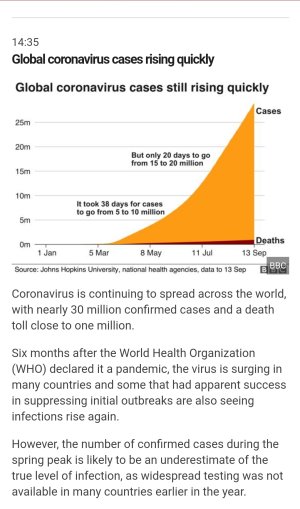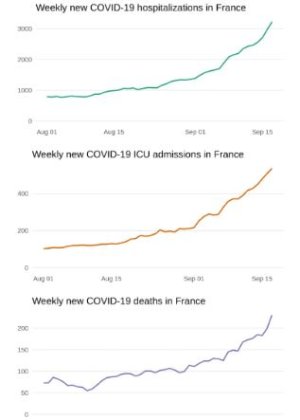How it all went wrong in Europe as second wave grips continent
After successfully tamping down the first surge of infection and death, Europe is now in the middle of a second coronavirus wave as it moves into winter -- raising questions over what went so wrong.
Daily case numbers in the European Union and United Kingdom this week reached record highs of more than 45,000 on a 14-day notification rate, according to the European Centre for Disease Prevention and Control (ECDC), and new restrictions are being imposed in places that were well into reopening. Leaders have raised fears over the pressure that hospitals could face in coming months and the looming prospect of new national lockdowns.
Europe's death rate has been stable for 72 days, according to the ECDC, although Bulgaria, Croatia, Malta, Romania and Spain are seeing death rate increases.
There are trends that may explain the deterioration. The surge comes just after the summer vacation season, as workers return to city centers and children go back to school. The World Health Organization has suggested the increase could be partly down to the relaxation of measures and people dropping their guard, and evidence indicates young people are driving the second surge in Europe.
Despite the rising numbers of cases, and recent deaths in Europe, the continent still compares favorably to the United States. Europe has reported 4.4 million cases and 217,278 deaths among a population of 750 million, while the U.S. has reported 6.7 million cases and 198,000 deaths in a population of 330 million.
The second wave
U.K. Prime Minister Boris Johnson on Friday told reporters that the U.K. is "now seeing a second wave coming in" and that it was "inevitable," as daily case numbers passed 4,000 for the first time since May.
"Obviously we're looking very carefully at the spread of the pandemic as it evolves over the last few days," Johnson said. "There's no question, as I've said for weeks now, that we could (and) are now seeing a second wave coming in. We are seeing it in France, in Spain, across Europe. It has been absolutely inevitable we will see it in this country.
"I don't want to go into second national lockdown. The only way we can do that is if people follow the guidance."
The U.K. has the highest number of deaths in Europe at more than 40,000 and new restrictions on social gatherings were imposed across England this week.
Johnson is facing a growing backlash even from his usual cheerleaders in Britain's right-wing press, with the Daily Telegraph and Spectator both questioning the government's game plan and Times of London columnist Matthew Parris writing that Johnson's "shine has gone."
Their damning words come amid widespread criticism of the U.K.'s collapsing test-and-trace system that even the PM admits has "huge problems."
New restrictions were also announced on Friday in Madrid, which accounts for approximately a third of all new cases in Spain, according to the Spanish Health Ministry. The country reported a record 12,183 daily cases on September 11, and has the highest number of cases in Europe at more than 600,000, with more than 30,000 deaths.
France recorded 13,215 new COVID-19 cases in 24 hours on Friday, according to data released by its National Health Agency, its highest tally since April. The figures also showed an increasing trend in hospital admissions with 3,626 new patients over the previous seven days. In one major French city, CNN reported this week that hospitals were close to running out of ICU beds.
The Czech Republic reported a record 3,130 daily infections Friday as masks were made mandatory in schools again, and the Netherlands reported a record 1,977 cases. Prime Minister Mark Rutte told a news conference that the country's number of daily infections was doubling in just over a week. "With an R of 1.4, that number will grow in three weeks to more than 10,000 per day," he said.
"You don't have to be a mathematician or virologist to understand that these kinds of numbers will inevitably work into the hospitals," he warned.
Restaurants, cafes, and bars in six Dutch regions will face new restrictions starting Sunday.
Italy recorded its highest tally since May on Friday with 1,907 daily cases; Poland recorded a record 1,002 daily cases on Saturday.
Where it went wrong
WHO Europe director Hans Kluge warned this week of "alarming rates of transmission" and a "very serious situation" in the region, adding that weekly cases have exceeded those reported during the March peak.
While there was an increase in cases in older age groups -- those aged 50 to 79 -- in the first week of September, Kluge said, the biggest proportion of new cases is still among 25- to 49-year-olds.
In late August, Kluge said the gradual increase in Europe's cases could be partly explained by "the relaxation of public health and social measures, where authorities have been easing some of the restrictions and people have been dropping their guard."
He said he was "very concerned that more and more young people are counted among reported cases," advising against large gatherings and parties.
In several countries, cases are rising particularly fast in densely populated cities, where people are returning to offices, schools and public places after measures eased following spring's peak.
Like Spain, Austria has seen its biggest spike in its capital. Chancellor Sebastian Kurz told national Austrian news agency APA last Sunday that the situation was ''particularly dramatic'' in Vienna, which has more than half of all registered new infections.
''We are at the beginning of the second wave. We are facing difficult months in the autumn and winter. The number of infections is increasing from day to day," he said in a tweet, asking Austrians to reduce social contacts as the obligation to wear face masks was expanded to more public places.
Turkey recorded 63 deaths in 24 hours this week, its highest one-day death count. Turkish health minister Fahrettin Koca said at his weekly coronavirus news briefing on September 2 that the country was "in the second peak of the first wave."
"We are at this threshold today because of the movement around the holiday period and weddings which are integral parts of our traditions."
Authorities in Italy said in late August that approximately 50% of new infections had been contracted during summer vacations, around the country and abroad, primarily among young adults who have not been cautious with social distancing and mask-wearing guidelines.
Countries including Greece and Croatia, largely spared by the first wave, saw fast case number rises in August as tourists took summer vacations following the reopening of Europe's internal borders in June.
But Europe can take some comfort from experience. Professor Mark Woolhouse, an epidemiologist at the University of Edinburgh, told CNN earlier this month that the initial lockdown was "never, ever going to solve the problem for us in Europe or anywhere else; it was simply deferring it."
While cases are rising, this can partly be attributed to increased levels of testing, and daily deaths in Europe are down from 3,788 on April 18 to 504 on September 18 on a seven-day rolling average, according to CNN analysis of figures from Johns Hopkins University.








